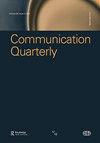Parents’ and children’s affectionate communication and risky driving behaviors: a dyadic investigation
IF 1
Q2 COMMUNICATION
引用次数: 0
Abstract
ABSTRACT This dyadic study of middle-aged parents and young adult children tested if perceptions of receiving affectionate communication were associated with tendencies to (a) exceed the speed limit when driving and (b) drive after consuming alcohol. Among other findings, children’s perceptions of receiving verbal affection, nonverbal affection, and social support from their parent were negatively associated with children’s tendency to drive after consuming one or two alcoholic drinks. Applying affection exchange theory to explain engagement in risky behaviors may comprise a nascent area of the theory’s development. Future researchers can consider if the type of relational partner whose perspective is being considered (e.g. a parent versus a child) bears implications for the extent to which affectionate communication is associated with risky behaviors.亲子情感交流与危险驾驶行为的二元调查
摘要:这项对中年父母和年轻成年子女的二元研究测试了接受深情交流的感知是否与(a)驾驶时超速和(b)饮酒后开车的倾向有关。在其他研究结果中,儿童对从父母那里得到的语言情感、非语言情感和社会支持的感知与儿童在喝了一到两杯酒精饮料后开车的倾向呈负相关。应用情感交换理论来解释风险行为的参与可能是该理论发展的一个新兴领域。未来的研究人员可以考虑考虑关系伴侣的类型(例如父母对孩子)是否对深情交流与危险行为相关的程度有影响。
本文章由计算机程序翻译,如有差异,请以英文原文为准。
求助全文
约1分钟内获得全文
求助全文

 求助内容:
求助内容: 应助结果提醒方式:
应助结果提醒方式:


